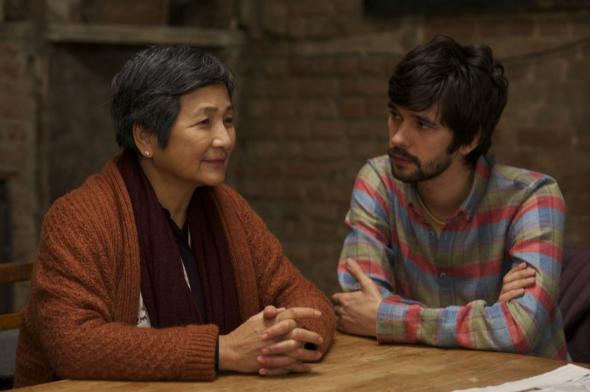We’ve become far too casual about coming out—or rather, in the way we think about coming out. Obviously, individual experiences can still be anything but casual; but on the cultural level, there’s a sense that in 2014, coming out is, if not yet a total formality, at most a task one must dutifully complete on the way to “It Gets Better” self-actualization.
It follows, then, that we tend to praise art attempting the contentious task of gay representation for leaving the now-gauche drama of coming out, well, out. We hunger, apparently, for new lenses through which to examine the gay experience (to the extent that we still believe in such a thing), the closet and all routes beyond it having, apparently, long since been mapped. It would seem that coming out can safely be added to the list of unfashionable things we are nowadays meant to be post.
But are we dismissing this trope too soon? Precisely because gay-themed art has indulged a certain melodramatic, Lifetime-esque approach to the “Coming Out Story” in the past, it seems to me that coming out—as a sort of narrative diagnostic through which human relationships might be tested and examined—is deserving of a little recuperation. This is why Lilting, the tightly composed, melancholy feature debut from Cambodian-born writer/director Hong Khaou, is so exciting. I cannot think of another film that so bracingly explores the unpredictable, sometimes painful ways a coming-out—or, more accurately here, a not-coming-out—can refract through the lives surrounding the person who is in, while managing to treat everyone involved with gentleness and empathy.
If this description seems overly conceptual for a modest indie film about a slightly senile older mother, her recently deceased son, and the man who, unbeknownst to Mom, loved him, it’s because Lilting rewards thematic meditation more than plot-tracking or deep character study.
Accordingly, the basic story is spare: Kai (Andrew Leung) has passed away, leaving his partner, Richard (Ben Whishaw), distraught in their apartment and his mother Junn (Cheng Pei Pei)—who declined to learn English or assimilate in any real fashion after emigrating to the U.K. with her family—in solemn mourning in the old-age home where she has been “locked up” against her wishes. Richard makes a habit of visiting Junn—much to her confusion and annoyance, since she’s never cared much for this “close friend” of Kai’s—and he eventually engages a translator (Naomi Christie) to help with communication, both with Junn and with her very British nursing-home paramour, Alan (Peter Bowles). Aside from some small scuffling over what to have for dinner and what to do with Kai’s remains, that’s about it. The drama of Lilting, such as it is, hinges on the way words, regardless of language, can evade our control (Khaou occasionally withholds subtitles to great effect); how we can be unable to hear some even when they are being screamed, while others, though whispered, resound like thunder.
Sitting like a black hole at the center of all this talk, however, are the words Kai never said—his is the kind of silence that has incredible mass, the kind of absence that warps the emotional space around it, making it near-impossible for Richard and Junn to travel along the ordinary trajectory of grief. Linguists define coming out as a type of “speech act,” an utterance that, when released into the world, not only conveys information but also carries with it the profound power to alter reality for speaker and hearer alike. Much in the same way the phrase “I do” literally creates spouses and reorders familiar and social relationships, the sentence “I am gay” creates (in a social sense) the speaker’s homosexual identity and, when spoken to family or friends, sets off a flurry of relational reconfigurations. But because Kai’s death prevented his coming out to Junn, these shifts were never properly catalyzed.
The trouble is, coming out is almost never a total surprise. Even if the exact word hasn’t come into focus, those around the person who is “in” can feel that some invisible force is acting on the relationship, palpably deforming its previous contours and introducing tension in the process. Conversation becomes strained, evasive; quotidian details become scarce; eyes are not met and feelings are hurt. Everyone can tell that something is coming, that something must be said. And when it finally is, there is relief and realignment—not always happiness, but a kind of visceral exhalation.
Lilting is a simulation of what can happen when that release never comes. Kai’s survivors are left stranded in this moody, overcast space, perfectly reflected in the movie’s emotional dampness and penchant for dreary settings. Memories, rendered here as flashbacks, become preoccupied with moments when the thing-not-said was most present: for Richard, arguments with Kai over his still being closeted; for Junn, visits with her son where pleas for closeness and familial loyalty were met with inexplicable anxiety and resistance. Bridges—linguistic, cultural, and ideological—that should have been built by Kai must be forged, far more clumsily, by Richard and a sympathetic translator for hire. And in the end, a neat “resolution” to all of this remains pleasingly, and plausibly, elusive.
It’s a fascinating scenario for a film to take up, as much for subtlety as novelty. And while the wistful scoring and artsy dance sequences can feel a bit precious at times, Khaou and his actors have, on the whole, created a significant thing in Lilting. The film is an argument for the notion that though the “coming out story” might be tired, stories about coming out continue to possess a great deal of potential. After all, there are few narrative forms as rich as the struggle to find the words that reveal ourselves, and in that revealing, make ourselves truly understood by those we love.
Lilting is currently playing in New York City and Los Angeles and will be opening in cities across the country over the fall.
